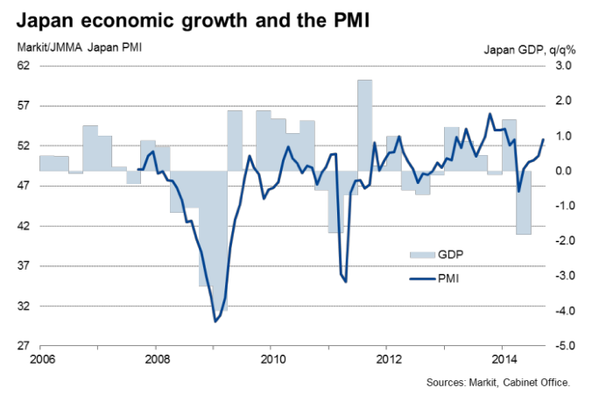Japan, the world’s No. 3 economy, is attempting to rev up its overall economy and fight off threats of deflation by ramping up its annual acquisition of government bonds, a move that would print vast sums of money and insert new yen into the economy.
According to the Bank of Japan (BOJ), the central bank will increase its purchases of government bonds and other assets by as much as 20 trillion yen ($181 billion) for a total of 80 trillion yen ($725 billion) every year. Furthermore, the BOJ is hoping to meet its two percent inflation target rate with this policy decision.
It will attempt to spur growth by encouraging businesses and consumers to spend more money and buy more stuff. Price inflation, however, has stayed above three percent, according to the government’s own numbers.
The purpose of this immense boost is to reverse the mindset that the country is facing deflation: new government data suggested inflation edged lower, household spending fell and unemployment inched higher. Meanwhile, Japan’s Nikkei 225 stock index soared nearly five percent soon after the BOJ’s announcement.
“What is important today is not only the BOJ action but also the news that the Japanese government’s pension fund will be increasing the allocation to Japanese equities,” said Alvin Tan, an FX strategist at Societe Generale in London, in an interview with Reuters. “This plus the fact the U.S. stock market appears to be experiencing a v-shaped recovery from the recent sell-off is preparing the ground for a pretty strong ‘risk-on’ situation until the end of the year.”

Here is what David Stockman, former Reagan budget director and author of “The Great Deformation,” wrote in a blog post opining on the recent BOJ news:
“In fact, this was just the beginning of a Ponzi scheme so vast that in a matter of seconds its ignited the Japanese stock averages by 5%. And here’s the reason: Japan Inc. is fixing to inject a massive bid into the stock market based on a monumental emission of central bank credit created out of thin air. So doing, it has generated the greatest front-running frenzy ever recorded.
“The scheme is so insane that the surge of markets around the world in response to the BOJ’s announcement is proof positive that the mother of all central bank bubbles now envelopes the entire globe. Specifically, in order to go on a stock buying spree, Japan’s state pension fund (the GPIF) intends to dump massive amounts of Japanese government bonds (JCB’s). This will enable it to reduce its government bond holdings—built up over decades—– from about 60% to only 35% of its portfolio.”
The BOJ’s ramped up stimulus initiative comes as the Federal Reserve announced this week that it would be ending its third round of quantitative easing. The United States central bank now maintains a balance sheet of more than $4 trillion. It remains to be seen if the Fed introduces a fourth round of QE since the markets have been volatile since the beginning of autumn.
In addition to this stimulus measure, Prime Minister Shinzo Abe is mulling over another two percent sales tax increase. In Apr. 2012, the Japanese government spiked the sales tax from five percent to eight percent, which slowed down the economy significantly. Polls suggest a majority of citizens are against it, but the central bank argues that Abe will need to make the difficult decision to help pay off the government’s debt.
Prior to the institution of the previous tax hike, consumers had bought a lot of big-box items before the sales tax had gone into effect. Soon after the sales tax went up three percent, consumers put their wallets back in their pocket.
It seems the BOJ is calling former Fed Chair Ben Bernanke for its policymaking.
Leave a Comment